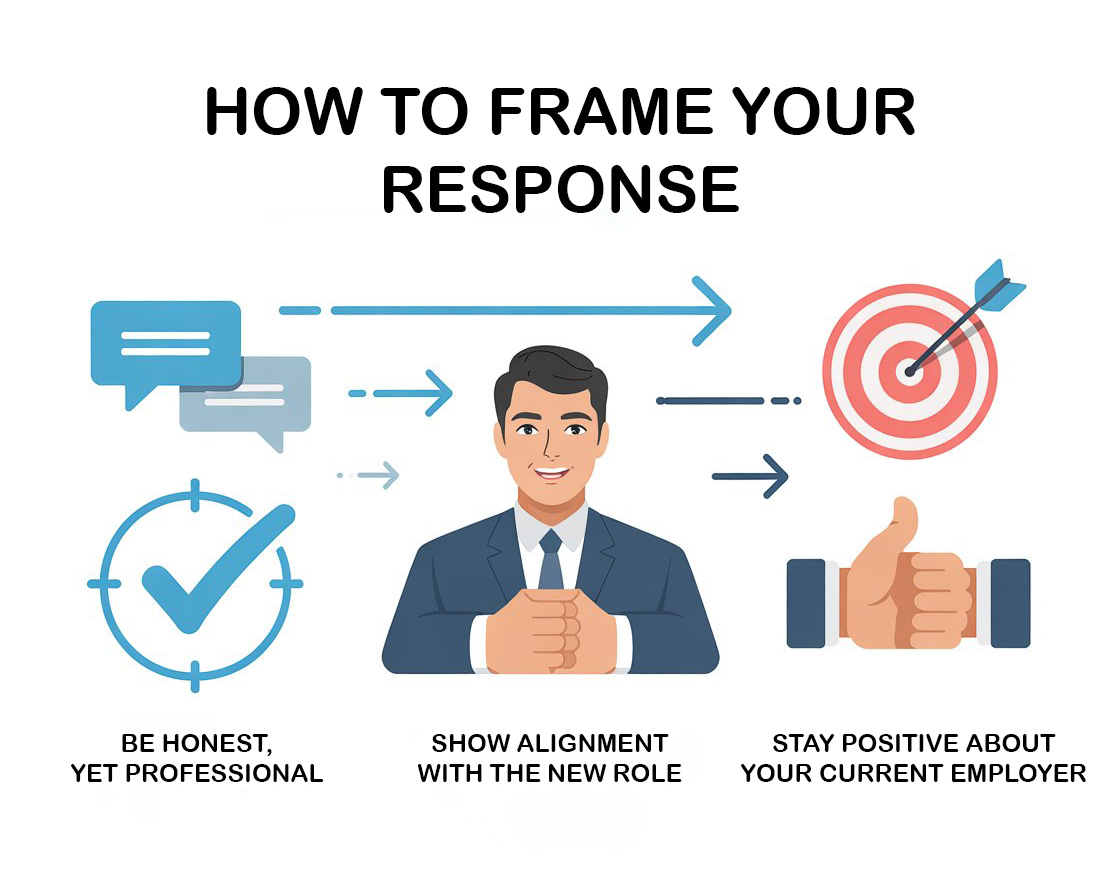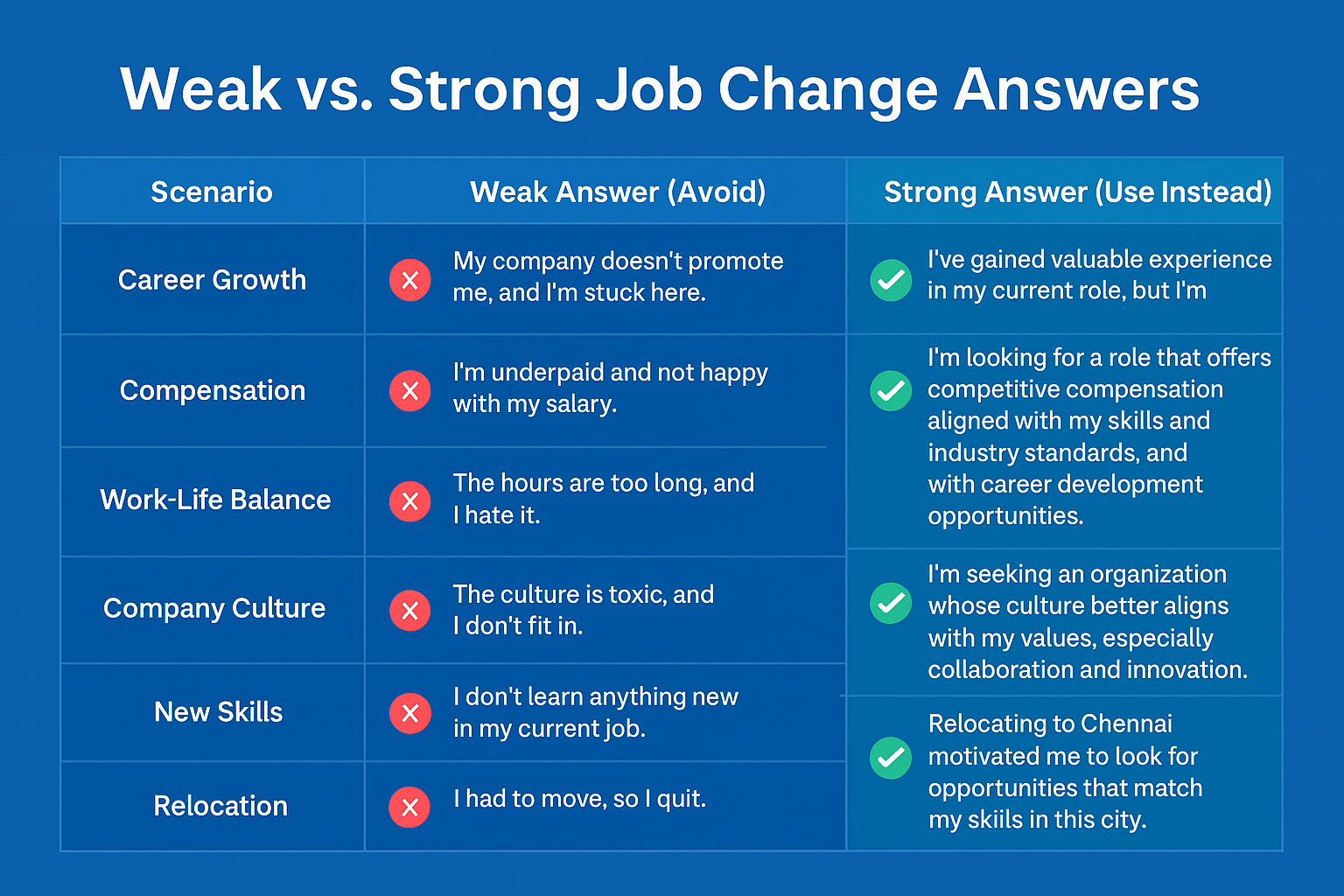Changing jobs is a common step in one’s career journey. Whether you are looking for professional growth, better compensation, or simply a new challenge, employers will almost always ask: “Why do you want to change your job?” The way you frame your answer can influence how hiring managers perceive your motivation and reliability.
In this guide, we’ll explore the top 10 reasons for job change that you can confidently discuss during interviews. We’ll also look at how to prepare answers for the common interview question, “Why do you want to change jobs?” without sounding negative about your current employer.
Top 10 Reasons for Job Change For Your Next Job Transitions
When asked about your reason for change in job, it’s important to provide a thoughtful explanation. Below are ten valid and professional reasons that are widely accepted by recruiters:
1. Career Growth Opportunities
One of the most cited reasons for job change is the lack of upward mobility in the current role. If you feel you’ve reached a ceiling, it’s natural to seek an environment where you can develop further.
2. Learning New Skills
Many candidates change jobs because they want exposure to new technologies, tools, or domains. Highlighting your interest in upskilling shows curiosity and a growth mindset.

3. Better Work-Life Balance
A demanding schedule, excessive travel, or long hours can push professionals to explore new opportunities where balance is valued.
4. Company Restructuring
Sometimes organizations go through mergers, downsizing, or role changes. Explaining that these shifts impacted your position is an acceptable reason to move on.
5. Desire for Stability
If your current company faces frequent layoffs or financial troubles, you can explain that you’re seeking a more secure work environment.
Popular Articles: selenium interview questions
6. Relocation Needs
Moving to a new city or closer to family often requires finding a new job. Employers understand this practical reason.
7. Looking for New Challenges
Some professionals outgrow their roles and crave more responsibility. Framing this as your motivation shows ambition rather than dissatisfaction.
8. Cultural Misfit
Sometimes, even if the job role is right, the organizational culture may not align with your values. Expressing this carefully can help recruiters see that you value long-term fit.
9. Compensation and Benefits
Salary isn’t everything, but it’s an undeniable factor. If compensation doesn’t match industry standards, seeking a role with better pay is a valid point.
10. Passion for a Different Industry
Shifting to a sector you’re more passionate about (like moving from banking to tech, or from retail to healthcare) is another strong reason. Employers appreciate candidates who want meaningful work.
When giving your explanation, choose one or two reasons that reflect your true motivation rather than listing all of them. Always stay positive and forward-looking.
Recommended for You: automation testing interview questions
Why Do You Want to Change Jobs
This is the exact wording most interviewers use. It’s also closely tied to variations like “Why are u changing your job?” or “Why do you want to change the company?”
Here’s how to frame your response:
- Be Honest, Yet Professional
Avoid negative comments like “I dislike my boss” or “The work is boring.” Instead, emphasize growth, learning, and future goals.
- Show Alignment with the New Role
Tailor your answer to highlight how the new opportunity matches your skills and aspirations. For example, “I want to work on large-scale automation projects, and your company’s focus on cutting-edge test solutions excites me.”
- Stay Positive About Your Current Employer
Even if the reason for change in job involves dissatisfaction, frame it respectfully. Example: “While I’ve learned a lot at my current company, I’m ready to take on more responsibility and lead projects, which this role offers.”

Smart Examples You Can Use
Here are a few sample answers that naturally incorporate different scenarios and keywords:
- “I’ve enjoyed my time in my current organization, but I feel I’ve reached the limit of growth opportunities. That’s why I want to change the job and explore roles where I can take on bigger challenges.”
- “The company I currently work for is going through restructuring, and many roles have shifted. I’m looking for stability and a position where I can add long-term value.”
- “I want to switch company because this opportunity aligns perfectly with my interest in cloud-based automation solutions. It also allows me to learn new technologies that my current role doesn’t offer.”
- “Relocating to Chennai is the main reason for change in job. I’m excited to find opportunities here that match my background.”
Notice how each response is polished, professional, and positive, while naturally blending in keywords like why u want to change the company or why you want to change your job.

Final Thoughts
When preparing for this question, remember that employers don’t just want to hear why you’re leaving. They want to know why this new role excites you. Keep your focus on career goals, personal growth, and how your strengths align with the company’s needs.
By clearly explaining your motivation, you transform a tricky interview question into an opportunity to showcase your ambition and professionalism.
FAQs
1. What are the top reasons for job change?
Common reasons include career growth, learning new skills, better work-life balance, company restructuring, relocation, and better compensation.
2. How do I answer ‘Why do you want to change your job?’
Frame your response positively. Focus on growth, alignment with the new role, and your career goals, while avoiding negative remarks about your current employer.
3. What is the best way to explain salary as a reason for job change?
Say, “I value this opportunity because it offers competitive compensation aligned with industry standards and my skills, along with career growth prospects.”
4. Should I be honest about leaving due to company culture?
Yes, but frame it positively: “I’m seeking a culture where collaboration and innovation are emphasized, aligning better with my strengths.”
5. How do freshers explain a reason for job change?
Freshers can highlight learning, skill development, or career alignment as their motivation instead of focusing on dissatisfaction.
We Also Provide Training In:
- Advanced Selenium Training
- Playwright Training
- Gen AI Training
- AWS Training
- REST API Training
- Full Stack Training
- Appium Training
- DevOps Training
- JMeter Performance Training
Author’s Bio:

Content Writer at Testleaf, specializing in SEO-driven content for test automation, software development, and cybersecurity. I turn complex technical topics into clear, engaging stories that educate, inspire, and drive digital transformation.
Ezhirkadhir Raja
Content Writer – Testleaf







